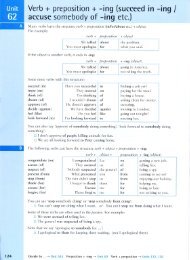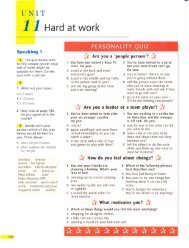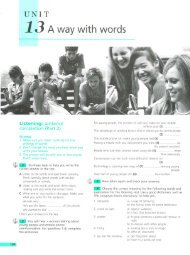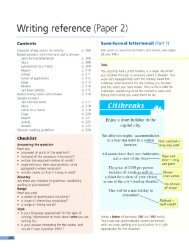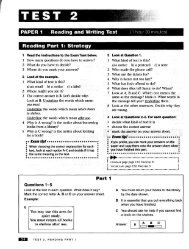I Vo.t are going to hear a news broadcast. Before you listen,look at ...
I Vo.t are going to hear a news broadcast. Before you listen,look at ...
I Vo.t are going to hear a news broadcast. Before you listen,look at ...
Create successful ePaper yourself
Turn your PDF publications into a flip-book with our unique Google optimized e-Paper software.
think of and think about:<br />
Wh<strong>at</strong> do <strong>you</strong> think of my new jacleet? It's gre<strong>at</strong>. (= wh<strong>at</strong> is <strong>you</strong>r opinion?)<br />
Wh<strong>at</strong> <strong>are</strong> <strong>you</strong> thinleing about? Lunch - I'm hungryl (= wh<strong>at</strong> is in<br />
<strong>you</strong>r mind?)<br />
throw <strong>at</strong> and throw ro (also shout <strong>at</strong> / point <strong>at</strong> and shout <strong>to</strong> / point <strong>to</strong>):<br />
The little boy threw the ball <strong>to</strong> his f<strong>at</strong>her. (= part of a game)<br />
Don't throw <strong>to</strong>ys <strong>at</strong> <strong>you</strong>r sister, Harry, <strong>you</strong> might hurt her. (= probably angry<br />
or rude)<br />
To be + adjective + preposition<br />
Some adjectives <strong>are</strong> nearly always followed by a particular preposition.<br />
These include:<br />
. engry about (something); Sha's engry about the theft of her purse.<br />
. angry with (someone): He's uery qngry with his assistant.<br />
s good /bad <strong>at</strong> (something): She's gooil <strong>at</strong> drawing fTowers.<br />
s pleased about (something): My p<strong>are</strong>nts uteren't Ttleased about rny bad report.<br />
t pleased with (something or someone): Granny was uery gileased. with the boole<br />
<strong>you</strong> sent her.<br />
s rude / polite <strong>to</strong> (someone): Don't be rude <strong>to</strong> anyone <strong>at</strong> the party.<br />
t (un)leind <strong>to</strong> (sorneone): The children were extemely unleinil <strong>to</strong> the new boy.<br />
2 Prepositions used <strong>to</strong> expreas who, how and why<br />
By, with and for<br />
We use by vith passive verbs, for the person or thing which does the action:<br />
The window was srnashedby Anily.<br />
The fire was startedby an electricalfaub.<br />
We use by * -ing <strong>to</strong> show how something is done:<br />
He smashed the window by hitting it with a hammer.<br />
He got inbybreaking a window.<br />
We use with + noun for a <strong>to</strong>ol (or other object):<br />
He smashed the window with aham.mer.<br />
He couered his face with his handkerchief.<br />
We use/or + -ing or a noun <strong>to</strong> explain the purpose of a <strong>to</strong>ol or other object:<br />
Hammers <strong>are</strong> norrrually for lenocking in nails, not for smashing windows!<br />
He leeeps a bag of <strong>to</strong>ols in his car for emergencies.<br />
We can also usepr + -ing or a noun <strong>to</strong> explain the reason for something:<br />
The owners of the house thanLeed himfor sailng their property.<br />
He received an award for bra.ntery.<br />
rg3


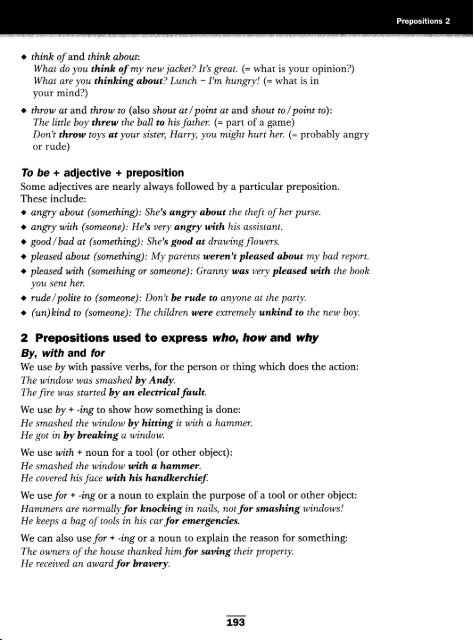
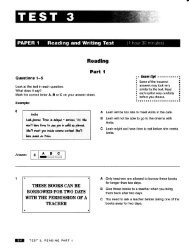
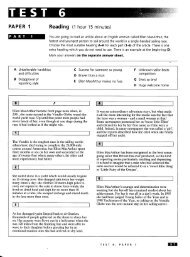
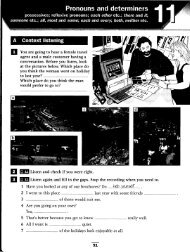
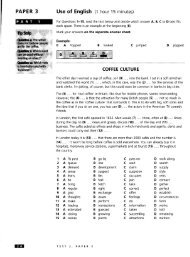
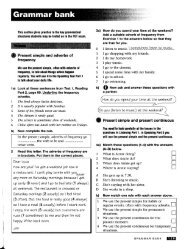
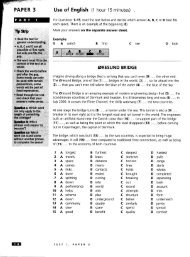
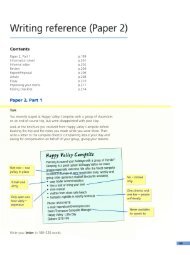

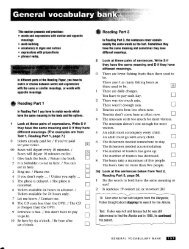
![T]NIT 9 A new look](https://img.yumpu.com/40125756/1/190x248/tnit-9-a-new-look.jpg?quality=85)
